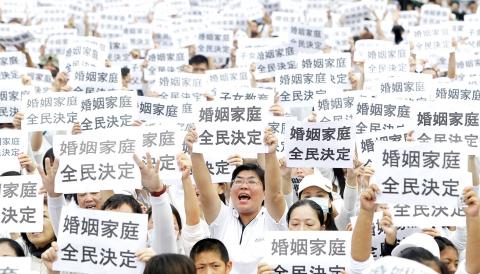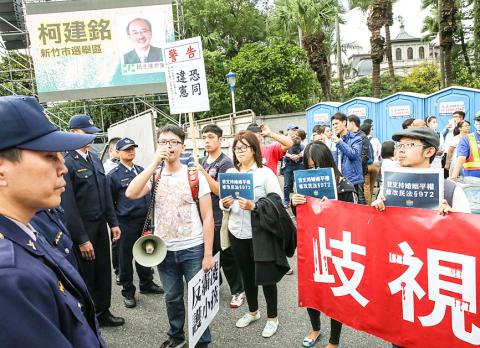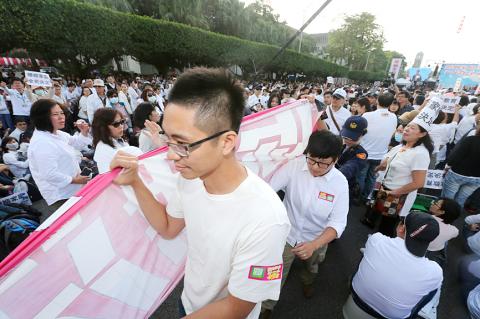Opponents of same-sex marriage yesterday rallied tens of thousands of people along Ketagalan Boulevard, in a massive protest against proposed Civil Code amendments.
Coalition for the Happiness of Our Next Generation, which organized the protest, said 80,000 people attended the demonstration, whose white-shirted crowd spilled out of Ketagalan Boulevard to encircle Jingfu Gate (景福門).
Organizers said that companion rallies in Taichung and Kaohsiung attracted an additional 90,000 participants.

Photo: AP
While a huge rally outside the Legislative Yuan last month was marked by Christian hymns and prayer, yesterday’s event had a more ecumenical bent, with protesters dancing to the children’s song Lovable Family.
Participants waved pieces of paper calling for a referendum on same-sex marriage and parental control over children’s education, after being forbidden from bringing their own banners by event organizers.
A skit called for what it called a pro-homosexual curriculum to be “driven out” of schools, with members of the crowd also throwing around two large black balls while calling for Democratic Progressive Party (DPP) Legislator Yu Mei-nu (尤美女) to “roll out” (滾出去) of Taiwan — a pun on the Mandarin expression for “scram.”

Photo: CNA
Yu has been one of the main sponsors of amendments to the Civil Code, which would legalize same-sex marriage, also serving as co-convener of the Judiciary and Organic Laws and Statutes Committee to which legislation has been referred.
Leaders from a cross-section of Buddhist, Daoist, Christian and other religious groups, which have joined the anti-gay marriage National Religious Alliance, were also featured.
“We oppose homosexual marriage being amended into the Civil Code because the family system comprised of marriage between one man and one woman is the foundation of society, and if you damage it, that will lead to marriage, family and the structure of society being completely wiped out,” alliance spokesman Chu Wu-hsien (朱武憲) said.

Photo: CNA
“Every person has a right to love, but there is also a proper order to love: We do not use the same manner to love animals as people, and love for a husband and wife is different from how you love friends,” Chinese Regional Bishops’ Conference secretary-general Otried Chan (陳科) said.
Chinese Nationalist Party (KMT) caucus convener Sufin Siluko (廖國棟) was the only national legislator who was observed taking the stage.
“My hope is that we can combine tolerance with a principled stand,” he said, adding that he was not representing the KMT caucus at the rally.
Several rows of counter-protesters rallied across a section of Zhongshan Road next to National Taiwan University Hospital with at least one banner-bearing group breaking into the main protest site, sparking a stand-off.
A small group of people late on Friday night had previously covered sidewalks and walls around Ketagalan Boulevard, the 228 Peace Memorial Park and the DPP’s headquarters with “reverse “graffiti slogans in favor of same-sex marriage.
About 10 people used a small cargo truck to haul a pressure washer around the site, spraying water at high speeds onto metal stencils to strip off grime and leave behind slogans condemning “special law” proposals and calling for “marriage equality now.”
“We are washing away grime to combat the mudslinging aimed at us,” said Liu Yu (劉宇) a gay Internet celebrity on online academic bulletin board system Professional Technology Temple (PTT), who accompanied the activists.
“Everyone has to do their part on this issue, and we hope people will recognize our efforts even though we do not have nearly as much money as the opposition,” he said, referring to numerous front-page newspaper advertisements and prime-time TV slots purchased in recent weeks by same-sex marriage opponents.
A rival protest in favor of gay marriage is scheduled for Saturday.
Additional reporting by Ye Kuan-yu

The Ministry of the Interior (MOI) is to tighten rules for candidates running for public office, requiring them to declare that they do not hold a Chinese household registration or passport, and that they possess no other foreign citizenship. The requirement was set out in a draft amendment to the Enforcement Rules of the Public Officials Election and Recall Act (公職人員選舉罷免法 ) released by the ministry on Thursday. Under the proposal, candidates would need to make the declaration when submitting their registration forms, which would be published in the official election bulletin. The move follows the removal of several elected officials who were

The Republic of China (ROC) is celebrating its 114th Double Ten National Day today, featuring military parades and a variety of performances and speeches in front of the Presidential Office in Taipei. The Taiwan Taiko Association opened the celebrations with a 100-drummer performance, including young percussionists. As per tradition, an air force Mirage 2000 fighter jet flew over the Presidential Office as a part of the performance. The Honor Guards of the ROC and its marching band also heralded in a military parade. Students from Taichung's Shin Min High School then followed with a colorful performance using floral imagery to represent Taiwan's alternate name

FOUR DESIGNATED AREAS: Notices were issued for live-fire exercises in waters south and northwest of Penghu, northeast of Keelung and west of Kaohsiung, they said The military is planning three major annual exercises across the army, navy and air force this month, with the navy’s “Hai Chiang” (海強, “Sea Strong”) drills running from today through Thursday, the Ministry of National Defense said yesterday. The Hai Chiang exercise, which is to take place in waters surrounding Taiwan, would feature P-3C Orion maritime patrol aircraft and S-70C anti-submarine helicopters, the ministry said, adding that the drills aim to bolster the nation’s offshore defensive capabilities. China has intensified military and psychological pressure against Taiwan, repeatedly sending warplanes and vessels into areas near the nation’s air defense identification zone and across

A Chinese takeover of Taiwan would severely threaten the national security of the US, Japan, the Philippines and other nations, while global economic losses could reach US$10 trillion, National Security Council Deputy Secretary-General Lin Fei-fan (林飛帆) wrote in an article published yesterday in Foreign Affairs. “The future of Taiwan is not merely a regional concern; it is a test of whether the international order can withstand the pressure of authoritarian expansionism,” Lin wrote in the article titled “Taiwan’s Plan for Peace Through Strength — How Investments in Resilience Can Deter Beijing.” Chinese President Xi Jinping’s (習近平) intent to take Taiwan by force